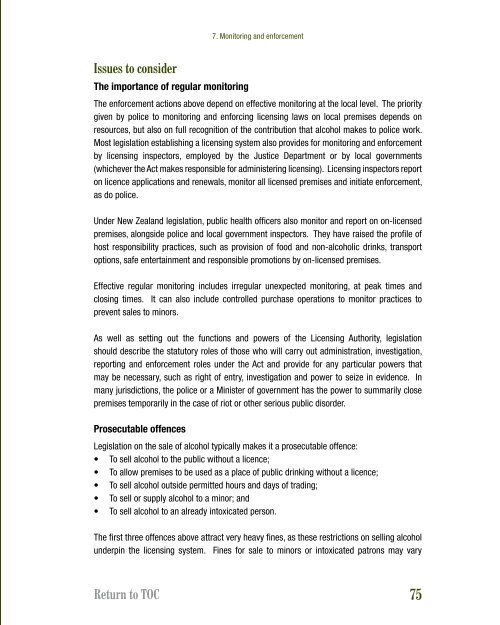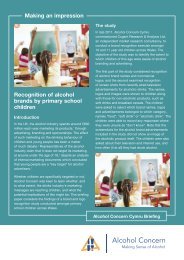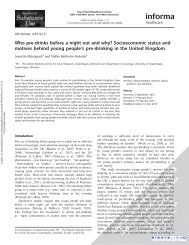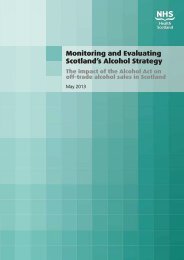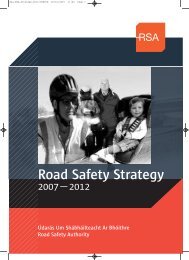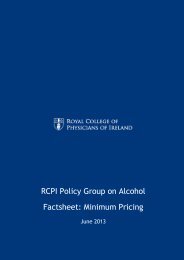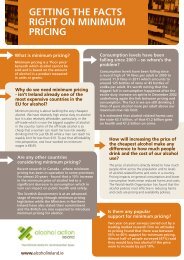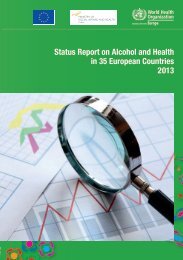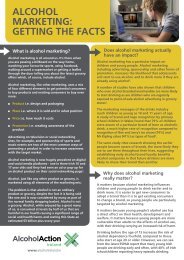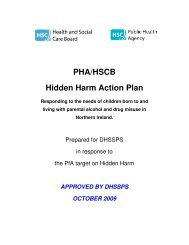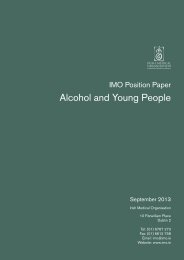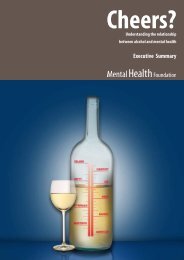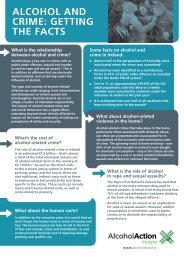Addressing the harmful use of alcohol - WHO Western Pacific Region
Addressing the harmful use of alcohol - WHO Western Pacific Region
Addressing the harmful use of alcohol - WHO Western Pacific Region
You also want an ePaper? Increase the reach of your titles
YUMPU automatically turns print PDFs into web optimized ePapers that Google loves.
7. Monitoring and enforcement<br />
Issues to consider<br />
The importance <strong>of</strong> regular monitoring<br />
The enforcement actions above depend on effective monitoring at <strong>the</strong> local level. The priority<br />
given by police to monitoring and enforcing licensing laws on local premises depends on<br />
resources, but also on full recognition <strong>of</strong> <strong>the</strong> contribution that <strong>alcohol</strong> makes to police work.<br />
Most legislation establishing a licensing system also provides for monitoring and enforcement<br />
by licensing inspectors, employed by <strong>the</strong> Justice Department or by local governments<br />
(whichever <strong>the</strong> Act makes responsible for administering licensing). Licensing inspectors report<br />
on licence applications and renewals, monitor all licensed premises and initiate enforcement,<br />
as do police.<br />
Under New Zealand legislation, public health <strong>of</strong>ficers also monitor and report on on-licensed<br />
premises, alongside police and local government inspectors. They have raised <strong>the</strong> pr<strong>of</strong>ile <strong>of</strong><br />
host responsibility practices, such as provision <strong>of</strong> food and non-<strong>alcohol</strong>ic drinks, transport<br />
options, safe entertainment and responsible promotions by on-licensed premises.<br />
Effective regular monitoring includes irregular unexpected monitoring, at peak times and<br />
closing times. It can also include controlled purchase operations to monitor practices to<br />
prevent sales to minors.<br />
As well as setting out <strong>the</strong> functions and powers <strong>of</strong> <strong>the</strong> Licensing Authority, legislation<br />
should describe <strong>the</strong> statutory roles <strong>of</strong> those who will carry out administration, investigation,<br />
reporting and enforcement roles under <strong>the</strong> Act and provide for any particular powers that<br />
may be necessary, such as right <strong>of</strong> entry, investigation and power to seize in evidence. In<br />
many jurisdictions, <strong>the</strong> police or a Minister <strong>of</strong> government has <strong>the</strong> power to summarily close<br />
premises temporarily in <strong>the</strong> case <strong>of</strong> riot or o<strong>the</strong>r serious public disorder.<br />
Prosecutable <strong>of</strong>fences<br />
Legislation on <strong>the</strong> sale <strong>of</strong> <strong>alcohol</strong> typically makes it a prosecutable <strong>of</strong>fence:<br />
• To sell <strong>alcohol</strong> to <strong>the</strong> public without a licence;<br />
• To allow premises to be <strong>use</strong>d as a place <strong>of</strong> public drinking without a licence;<br />
• To sell <strong>alcohol</strong> outside permitted hours and days <strong>of</strong> trading;<br />
• To sell or supply <strong>alcohol</strong> to a minor; and<br />
• To sell <strong>alcohol</strong> to an already intoxicated person.<br />
The first three <strong>of</strong>fences above attract very heavy fines, as <strong>the</strong>se restrictions on selling <strong>alcohol</strong><br />
underpin <strong>the</strong> licensing system. Fines for sale to minors or intoxicated patrons may vary<br />
Return to TOC<br />
75


